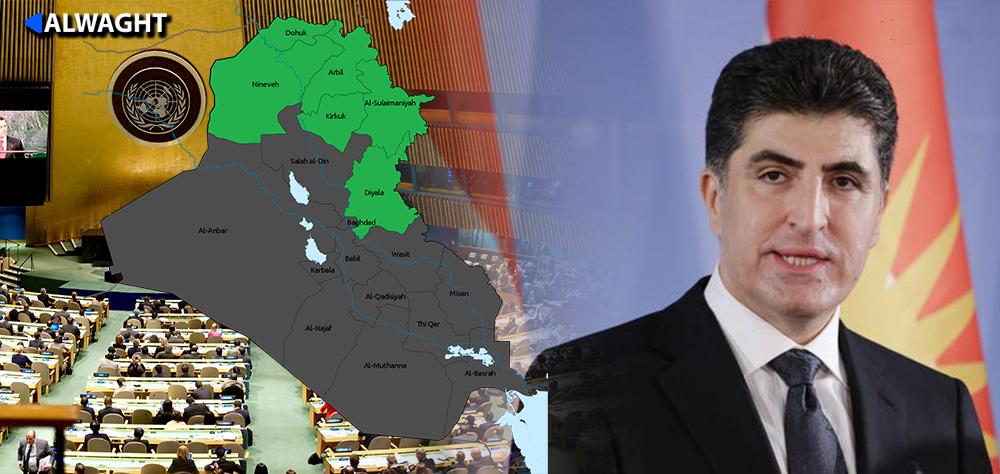Alwaght- While Erbil recently struck a deal on the long-disputed oil and budget issues with the central government, President Nechirvan Barzani of the Iraqi Kurdish region in a letter to the UN Secretary-General Antonio Guterres and the Security Council members called for expansion of role of the UN representative to Iraq especially in addressing the disputes between Erbil and Baghdad. He called for implementation of the Article 140 of the constitution, oil and gas-related laws, and distribution of the incomes.
More surprisingly, Barzani went on to call for an increase in supervisory role of the UN in the October parliamentary elections of Iraq. Such a letter to the UN by the Kurdistan Regional Government (KRG) is not new, but the new political and governing conditions of Iraq are way different than before. This highlights the significance of Barzani's letter and the goals behind it in the current circumstances. Two goals seem to be standing as drivers behind the letter.
Non-state meddling to pressure central government
Since 1991 that the Iraqi Kurds established their autonomy under the auspices of the US-led international coalition under UNSC resolution 688 and the no-fly zone, they have always regarded the West as a path to materialization of their demands. In the eyes of the Kurdish leaders— made of Kurdistan Democratic Party (KDP) and the Patriotic Union of Kurdistan (PUK)— the US and Europe can help protect the gains they have made so far.
This vision even toned up after 2003, the year the Saddam Hussein regime fell and the federal government in Kurdistan in northern Iraq was legalized with the arrival of the new Iraqi constitution.
During the new era, the Kurds, in addition to the US and Europe, turned their eyes to the UN as a gate for their demands realization. It is noteworthy that a local government under the name of the Kurdistan Regional Government, although mentioned in the Iraqi constitution as an official constitution, is by no means an independent governmental institution on international stage. Actually, it has not been and cannot be described as an institution with mandate for independent international correspondence.
Barzani, according to the Iraqi constitution, is devoid of the qualifications for correspondence with the UN to make demands. In fact, the UN is based on a nation-state structure and in its administrative system, a local government has neither voting nor meddling rights. It is with this consideration that Barzani's letter to Guterres should be regarded a politically illegal move referring the internal affairs to UN to put strains on the central government.
Erbil seeking executive guarantees
Just unlike in the years following the fall of Baathist regime in which the new government and constitution went into effect, Erbil now has not much lobbying and influencing power in Baghdad. In the early years of the new Iraqi political system, the Kurds as one of the key players has had role in establishing new government and constitution, along with Shiites. However, wrong policies of former leader of the autonomous region and the KDP Masoud Barzani undermined the region and increasingly isolated it.
In particular, Barzani's arrangement of the independence referendum on September 25, 2017, which resulted in a major defeat for the Kurds, reduced the Kurdish bargaining power in Baghdad on contentious issues and its role in making major policies for the Iraqi future. In fact, on the one hand, the foundations of trust between the Kurds and the central government have collapsed, and on the other hand, the Kurds no longer have the capabilities and pressure cards to influence the decisions of the parliament and the central government in Baghdad.
As the KRG is in such a weak position, Barzani is seeking foreign executive guarantees to the recently-made agreements with Baghdad on budget share delivery to Erbil. In other words, through correspondence with the UN, Barzani tries to paint this international institution the guaranteeing factor for the Erbil-Baghdad agreement. The Kurds have come up with the notion that any disloyalty to the accords made can trigger strong responses from the government and members of parliament.
Due to its consumptionist economic policies and corruption of the ruling elite, Erbil not only failed to make the most of the oil revenues to construct the economic infrastructure but also borrowed money from the foreign creditors and oil companies only to immerse in a huge foreign debt and economic crisis. This will cut Erbil's ability to meet the commitment of delivering oil revenues to Baghdad, according to the deal, in return for budget share delivery from Baghdad.
The Iraqi Kurds, repeating their historic mistakes, intend to put all of their eggs in the basket of foreign, and especially Western, support, ignoring the point that the only right path to bringing stability and settling the differences with Baghdad is respecting the national Iraqi constitution and protecting the national Iraqi independence and sovereignty away from calling for crisis-making foreign interventions.



























